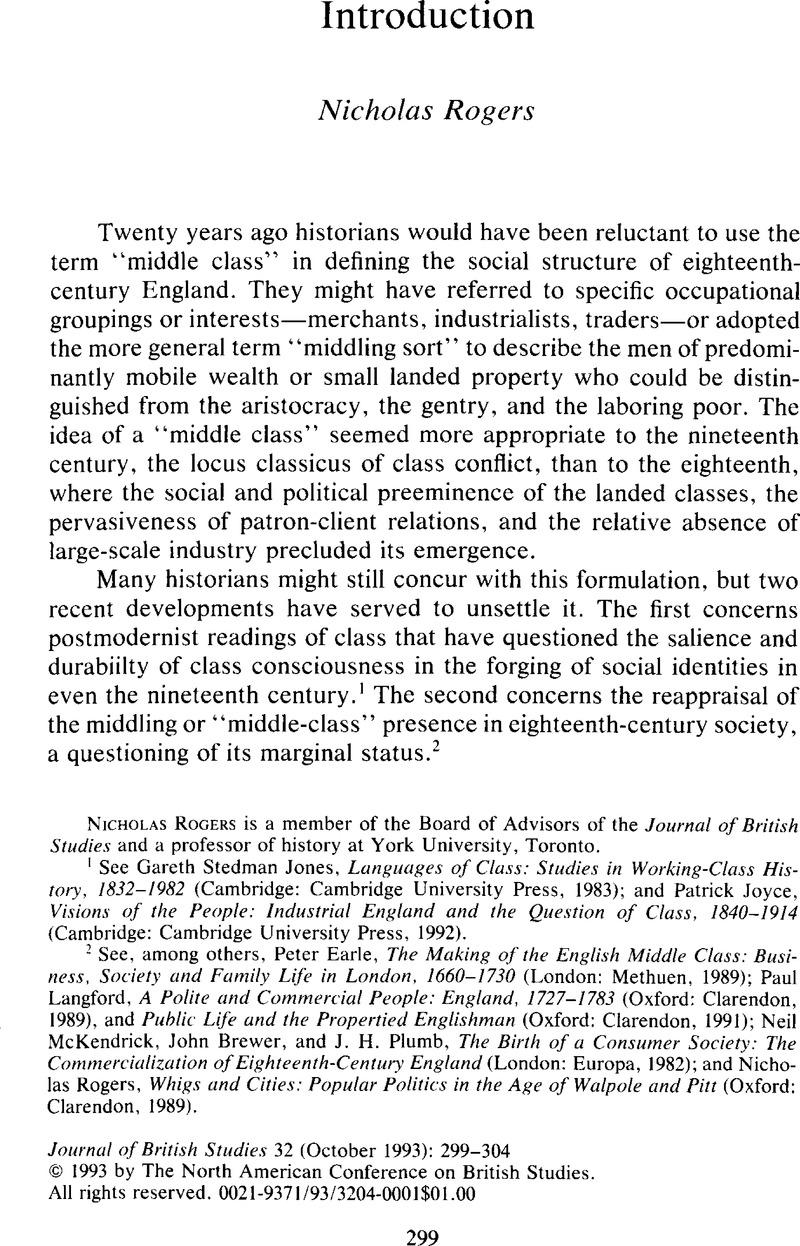No CrossRef data available.
Article contents
Abstract

- Type
- Introduction
- Information
- Journal of British Studies , Volume 32 , Issue 4: Making the English Middle Class, ca. 1700-1850 , October 1993 , pp. 299 - 304
- Copyright
- Copyright © North American Conference of British Studies 1993
References
1 See Jones, Gareth Stedman, Languages of Class: Studies in Working-Class History, 1832–1982 (Cambridge: Cambridge University Press, 1983)Google Scholar; and Joyce, Patrick, Visions of the People: Industrial England and the Question of Class, 1840–1914 (Cambridge: Cambridge University Press, 1992)Google Scholar.
2 See, among others, Earle, Peter, The Making of the English Middle Class: Business, Society and Family Life in London, 1660–1730 (London: Methuen, 1989)Google Scholar; Langford, Paul, A Polite and Commercial People: England, 1727–1783 (Oxford: Clarendon, 1989)Google Scholar, and Public Life and the Propertied Englishman (Oxford: Clarendon, 1991)Google Scholar; McKendrick, Neil, Brewer, John, and Plumb, J. H., The Birth of a Consumer Society: The Commercialization of Eighteenth-Century England (London: Europa, 1982)Google Scholar; and Rogers, Nicholas, Whigs and Cities: Popular Politics in the Age of Walpole and Pitt (Oxford: Clarendon, 1989)Google Scholar.
3 For the latest statement of the patrician/plebs polarity, see Thompson, E. P., Customs in Common (London: Merlin, 1991)Google Scholar, chap. 2.
4 On this theme, see E. P. Thompson, Customs in Common, chaps. 4–5.
5 See Kramnick, Isaac, Republicanism and Bourgeois Radicalism: Political Ideology in Late Eighteenth-Century England and America (Ithaca, N.Y.: Cornell University Press, 1990)Google Scholar.
6 These quotations are taken from the Morning Chronicle (December 12–29, 1797) and Cobbett's Parliamentary Debates, 33:1084, 1102–3, 1170–3, 1249Google Scholar. See also Corfield, P. J., “Class by Name and Number in Eighteenth-Century Britain,” History 72 (1987): 38–61CrossRefGoogle Scholar; and Wahrman, Dror, “Virtual Representation: Parliamentary Reporting and Languages of Class in the 1790s,” Past and Present, no. 136 (1992), pp. 82–113Google Scholar.
7 Compare Davidoff, Leonore and Hall, Catherine, Family Fortunes: Men and Women of the English Middle Class, 1780–1850 (London: Hutchinson, 1987)Google Scholar.
8 See Anderson, Perry, In the Tracks of Historical Materialism (London: Verso, 1983)Google Scholar.




